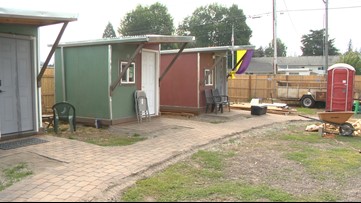The micro-village is on private church property which the nonprofit WeShine leases for $1,200 a month.
 PORTLAND, Ore. — Construction crews recently put the finishing touches on a new tiny-home village for those experiencing homelessness that opened in Northeast Portland last week.
PORTLAND, Ore. — Construction crews recently put the finishing touches on a new tiny-home village for those experiencing homelessness that opened in Northeast Portland last week.
The Parkrose Community Village is run by a nonprofit called WeShine and takes a slightly different approach to housing the homeless than outdoor shelters like the city’s Safe Rest Villages, though the individual homes are similar.
“It’s important for them to feel safe and secure,” said Jan McManus, who runs WeShine.
Four people have moved into the village thus far, and more are on the way. McManus said they already have a waitlist and plan to fill the village within three weeks.
“It’s easier to manage and less threatening to neighbors, so we’ve deliberately chosen to stay very small,” she said.
The micro-village is on private church property that WeShine leases for $1,200 a month. It will take about $350,000 a year to run it. That money comes from fundraising and the Joint Office of Homeless Services.
“We think it will be successful because people have privacy and safety in these units, and they get a high degree of personal service.”
The village looks to provide a low barrier to entry. Drug and alcohol use is not prohibited — in fact, it is allowed inside each pod. The city’s Safe Rest Villages, while not going so far as to disqualify residents for drug or alcohol use, do not allow their use on the premises. Some other outdoor shelter communities in Portland require sobriety from their residents.
“If you want to get people off the street you can’t set up a bunch of extra hoops for them to go through,” McManus explained. “The use of drugs and alcohol can be part of a survival mechanism to make it in the very, very hard circumstances of living on the street.”
McManus knows some nearby businesses and neighbors are worried about the fact that drugs and alcohol will be allowed. The shelter is also allowing the villagers to make some of the rules.
“Our model calls for there to be a village council. We support them to be as autonomous as they can be and make most of the day-to-day decisions about how the village will operate,” said McManus.
They’ve already come up with two rules: The villagers want the ability to sign off on new residents, and if someone steals they will be immediately kicked out.
“The villagers are really stepping up and giving hold to their voice and their thoughts,” McManus said.
As outdoor villages like this one begin to open up across Portland, the city is proposing a change in zoning rules to make it easier for groups like WeShine to help get people off the streets.
“I’m all for it because I think we need more of these, because we need private sector and public sector to work together to solve this problem,” said McManus.
The city’s Bureau of Planning and Sustainability is proposing to change four zoning rules in order to ease the process, including allowing outdoor shelters to be five feet from all property lines as opposed to at least 25 feet from residentially zoned properties; reducing fence requirements from totally obscure wooden fences, like the one at the Parkrose Community Village, to allowing partially obscured chain link fences to cut down on costs; and allowing outdoor shelters to be in parking lots — specifically, church parking lots.
“When small nonprofits like ours try to do these things, it’s very difficult for us to deal with construction and permits and these kinds of things … we could actually use more help.”
WeShine plans to build two or three of these micro-villages each year for the next several years. They look for private or public land that’s close to transportation and in neighborhoods. As for the proposed zoning changes, the city will hold a public hearing next month.

